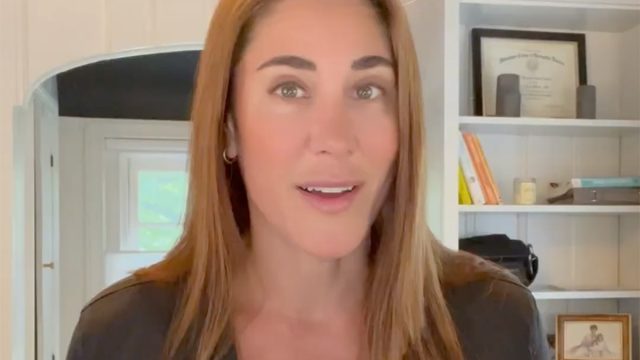I'm a Doctor and These are the COVID Symptoms I'm Seeing
Dana Mincer, DO, weighs in on how dangerous the new variant actually is.
Ever since the start of the pandemic, experts have said that COVID-19 will continue mutating. The latest variant spreading across the country is "PIrola" or "BA.2.86." How dangerous is the latest incarnation of the deadly virus? In a new YouTube video, Dana Mincer, DO, a Philadelphia family practice and urgent care physician, weighs in on the symptoms she is seeing now.

In the video, Dr. Mincer explains that BA.2.86 is a highly "mutating variant of omicron." While many other variants have mutated two to ten times, this one has undergone many more.

"This one has 30, and that was what the concern was," she explains about why health experts have been watching it carefully. "However, early data and research are showing that this variant is no more of an issue than any other variant, and this is likely because of a combination of both vaccination and exposure."

She explains that "because a lot of the society has been either vaccinated and or exposed to the virus already, you have some version of immunity to this virus," which is a good thing.

"Hospitalizations have increased for seven straight weeks, and rose more than 15% for the week ending Aug. 26, to 17,418, according to the latest data from the CDC. But that number remains below the surge the nation saw in summer 2022, when hospitalizations climbed to more than 40,000," says CNBC. "The uptick is fueled by newer — but closely related to XBB.1.5 — strains of the virus such as EG.5, or Eris. That omicron strain accounted for 21.5% of all cases as of Sept. 2, according to the CDC."

As for symptoms, "most people are presenting with anywhere from fever, chills, just general flu-like illnesses, your typical influenza to milder illnesses like sinus issues, sinus infection, cold symptoms," she says. "Oftentimes, people can test positive at home or in the days leading up to it, and when they end up in my urgent care, we retest them."
6
Other Doctors Warn You Could Get Long COVID

"We know that you don't necessarily have to be hospitalized to get long COVID," Dr. Anthony Fauci has said. "It ranges from people who are mildly to moderately symptomatic to individuals who are actually requiring hospitalization." Fauci previously described long COVID: "Anywhere from 25% to 35%—or more—have lingering symptoms well beyond what you would expect from any post-viral syndrome like influenza and others. It's fatigue, shortness of breath, muscle aches, dysautonomia, sleep disturbances, and what people refer to as brain fog. That can last anywhere from weeks to months." They may never go away.

There is growing evidence that people with COVID-19 are dealing with ongoing sleep problems. "The patients we're seeing who are post-COVID have a variety of sleep problems that are common in the community," says Kingman Strohl, MD, who specializes in pulmonary and critical care medicine and sleep medicine at University Hospitals. "In recovery from a viral illness or critical illness, there is poor sleep and disruption of the sleep/wake cycle, and also stress and disruptions in activity levels. All these distract from good sleeping habits. People with a tendency for insomnia before COVID-19 often have more problems afterwards. The same drugs no longer work as well and some have developed bad habits. People with sleep apnea before COVID sometimes need adjustments in their therapy because they may develop sensitivity to the treatments, sleeplessness, circadian rhythm disorders and so forth."

Doctors are still investigating just why COVID-19 causes severe immune issues several months after recovery from the virus. "Some people's immune systems go haywire after Covid. We're trying to look at the similarities between chronic fatigue and fibromyalgia and long Covid," says W. Michael Brode, medical director of the post-COVID program at UT Health Austin in Austin, Texas. "We've seen post-viral illnesses cause chronic fatigue, small fiber neuropathy, autonomic dysfunction. I think there's something probably specific to Covid, but we've never seen a virus on this scale in the modern era."

Breathing issues are a common symptom of COVID-19—but for some people, this goes on for months and can lead to serious health conditions. "It's not uncommon for patients who recover from the acute phase of COVID-19 to have continued respiratory symptoms, such as shortness of breath, chest pain and coughing," says UH pulmonologist David Rosenberg, MD, MPH. "These symptoms may last weeks or months. But if they become worse, you may be developing a complication of COVID-19. The inflammation from COVID-19 can cause pneumonia throughout the lungs, even during the recovery phase. The blood can be sticky because of the inflammation, and you can develop blood clots. Also, the inflammation from COVID can irritate asthma. Because the heart and lungs are integrated, some COVID-19 patients with ongoing breathing problems are diagnosed with a heart problem. The virus can cause inflammation of the muscle of the heart or the pericardium, the membrane surrounding the heart. These problems can lead to shortness of breath. If you're developing worsening respiratory symptoms, you really need to seek medical attention."

"We also know there are strokes related to the clotting disorder from COVID-19," says neurologist Cathy Sila, MD, Director of the Stroke Center at the Neurological Institute at University Hospitals. "These can affect the arteries, causing paralysis, speech difficulties and difficulties walking. They can also affect the veins in the brain and cause brain swelling. That can lead to terrible headaches and difficulty doing daily activities. There are a number of infectious and immune-related complications that can affect the brain, the spinal cord and peripheral nerves. It's important to understand if it's the infection or immune response causing the problems, because they're treated differently."

Viral pneumonia is dangerous, because there are limited ways to treat it, compared to regular pneumonia. "Some patients with COVID-19 develop pneumonia," says Lisa Maragakis, M.D., M.P.H. "Viral pneumonia, including that caused by COVID-19, cannot be treated with antibiotics. Some severe cases of COVID-19 may require ventilator support to ensure the body is getting enough oxygen. Other medications, including antivirals, may also be administered. People over age 65 and those with certain health conditions are at a higher risk of developing pneumonia and may experience more severe cases of COVID-19. Studies show that in patients with COVID-19, pneumonia may progress into acute respiratory distress syndrome (ARDS), which can be fatal in some patients."
RELATED: Surprising Signs You've Already Had COVID

As for treatment for the new variant? "If you're having sick symptoms, stay home, listen to your body. If you're sick with fever, chills, body aches, and you're just really fatigued, you probably need to be in bed resting. And if you have more milder symptoms, maybe the option is that you work from home for a few days."















